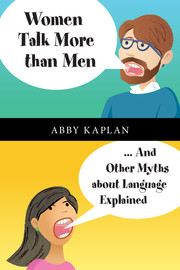Book contents
- Frontmatter
- Contents
- List of figures
- List of tables
- Acknowledgments
- 1 Introduction
- Part I … But is it language?
- Part II Language learning
- 5 ‘Children have to be taught language’
- 6 ‘Adults can't learn a new language’
- 7 ‘Being bilingual makes you smarter (or dumber)’
- Part III Language in use
- Appendix A Statistics brief reference
- Language index
- People index
- General index
7 - ‘Being bilingual makes you smarter (or dumber)’
from Part II - Language learning
Published online by Cambridge University Press: 05 April 2016
- Frontmatter
- Contents
- List of figures
- List of tables
- Acknowledgments
- 1 Introduction
- Part I … But is it language?
- Part II Language learning
- 5 ‘Children have to be taught language’
- 6 ‘Adults can't learn a new language’
- 7 ‘Being bilingual makes you smarter (or dumber)’
- Part III Language in use
- Appendix A Statistics brief reference
- Language index
- People index
- General index
Summary
In many parts of the world, bilingualism or multilingualism is just a fact of life: if many languages coexist in the same area, then learning additional languages is an ordinary part of growing up. But there are other places in the world – for example, many areas of the United States and Canada – where a single language is so dominant that many people don't have the need, or even the opportunity, to learn more than one language.
Since bilingualism isn't a necessity in these places, it has naturally become a matter of choice. Individuals choose whether to learn and use an additional language; parents who speak a minority language choose whether to raise their children bilingual; schools choose whether to offer bilingual education or foreign-language immersion programs. And with these choices, the obvious question is, ‘What's the best choice? Is bilingualism good or bad?’
Put that way, the question is obviously too simplistic. The first part of this chapter makes this point more thoroughly, illustrating just how varied ‘bilingualism’ is: there are many different types of bilingualism, at both the individual and social levels. It's just not possible to answer the question of what bilingualism is like ‘in general’; the best we can do is talk about specific ways of being bilingual.
But there's also a long tradition of linguistic and psychological research that essentially does try to answer the question of whether bilingualism is good or bad. Specifically, there's a large body of research that explores whether bilingualism – especially in children – helps or harms a person's intelligence. One of the most fascinating things about this research tradition is that the consensus of the field changed dramatically during the twentieth century: early researchers were convinced that bilingualism was harmful, but most researchers today believe it's beneficial. In our case study at the end of this chapter, we'll take a closer look at these studies: what caused this reversal, and what (as far as we can tell) is the real effect of bilingualism?
What does it mean to be bilingual?
If we describe a person as bilingual, we mean the person speaks two different languages. Similarly, a multilingual person speaks several languages. The idea is simple – deceptively so.
- Type
- Chapter
- Information
- Women Talk More Than Men... And Other Myths about Language Explained, pp. 132 - 152Publisher: Cambridge University PressPrint publication year: 2016



